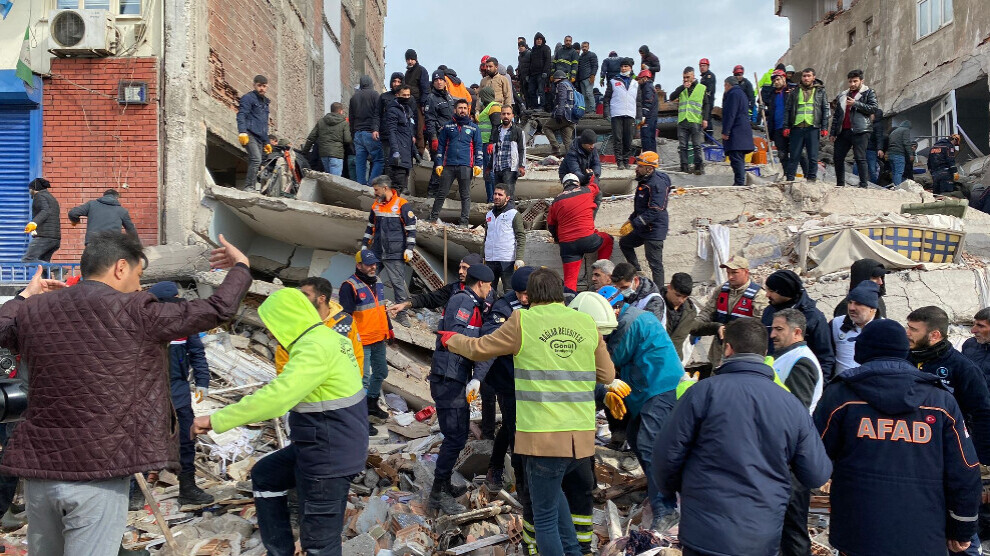Turkish government exploits the earthquake
Turkish President Recep Tayyip Erdoğan has declared a state of emergency in ten provinces affected by the earthquake. The measure prevents both civilian self-help and transparent reporting.
Turkish President Recep Tayyip Erdoğan has declared a state of emergency in ten provinces affected by the earthquake. The measure prevents both civilian self-help and transparent reporting.

The earthquakes in ten provinces in Turkey, whose epicentres were the districts of Pazarcik and Elbistan in the province of Maraş, killed thousands of people and the number of people trapped under the rubble is unknown. Even two days after the earthquake, there are settlements that no government aid has reached yet. People are trying to rescue those trapped under the rubble with their own resources. But instead of strengthening civilian disaster relief and planning further relief measures for the earthquake victims, the Turkish government declared a state of emergency (OHAL) on the second day after the quake.
Turkish President Recep Tayyip Erdoğan said in an address to the nation: "The scale of the earthquake disaster and its impact make it imperative for us to take extraordinary measures. We are declaring ten provinces where the earthquake occurred as disaster areas. We have decided to declare a state of emergency in the ten provinces most affected by the earthquake for a period of three months, based on the powers granted to us by Article 119 of the Constitution, in order to ensure that search and rescue and subsequent work can be carried out quickly. We will complete the necessary steps for this in Parliament as soon as possible."
It is to be feared that Erdoğan will exploit the earthquake and the imposition of a state of emergency to prevent opposition forces in particular from organising urgently needed self-help in the affected areas. Thus, Erdoğan wants to use the earthquake disaster as a pretext to let the upcoming elections in the Kurdish areas take place under state of emergency conditions.
Shortly after the first quake, civil society organisations, political parties and the civilian population in the affected areas organised aid with their own resources, while the responsible state authorities initially remained inactive. With the imposition of the state of emergency, self-organised aid is prevented or severely restricted.
Furthermore, it is also to be expected that the state of emergency will severely restrict reporting from the earthquake areas and thus conceal the devastating effects of the disaster and the failure of state emergency aid. Especially in the Kurdish areas, the experiences after the severe earthquake in Van in 2011 have justifiably led to a high level of mistrust in the state disaster relief, and it is also evident after Monday's quake that the deployment of the rescue forces is insufficient and the provision of relief goods for those affected is questionable.
Turkey is in the middle of an election campaign, which is why it is especially important now for Erdoğan and his AKP/MHP government to silence critical voices. Especially with regard to the extent of the destruction and the number of victims, the official reports and eyewitness accounts and the statements of those affected diverge widely. While the government pretends to have the situation under control, people from the disaster areas report that they have not yet received any help. Images and reports from the people on the ground, NGOs and opposition parties are unwanted and are now to be prevented by the imposition of a state of emergency.
The question is already being asked more and more loudly whether the extent of the destruction caused by the quake could not at least have been limited by more stable construction methods. It is common knowledge that Turkey is an earthquake zone and that there have been repeated quakes in recent years. Criticism is levelled at the fact that, in recent years, new buildings in particular have been constructed to such a poor quality that they collapsed like houses of cards during an earthquake. This is said to have particularly affected the housing estates of the state building authority, TOKI.
The Minister of Environment, Urbanisation and Climate Change, Murat Kurum, said, "We will not allow any coordination other than through government disaster relief." Donations in kind and cash will also only be allowed to be collected through AFAD. With this justification, the relief goods collected by NGOs for the earthquake victims are confiscated.